
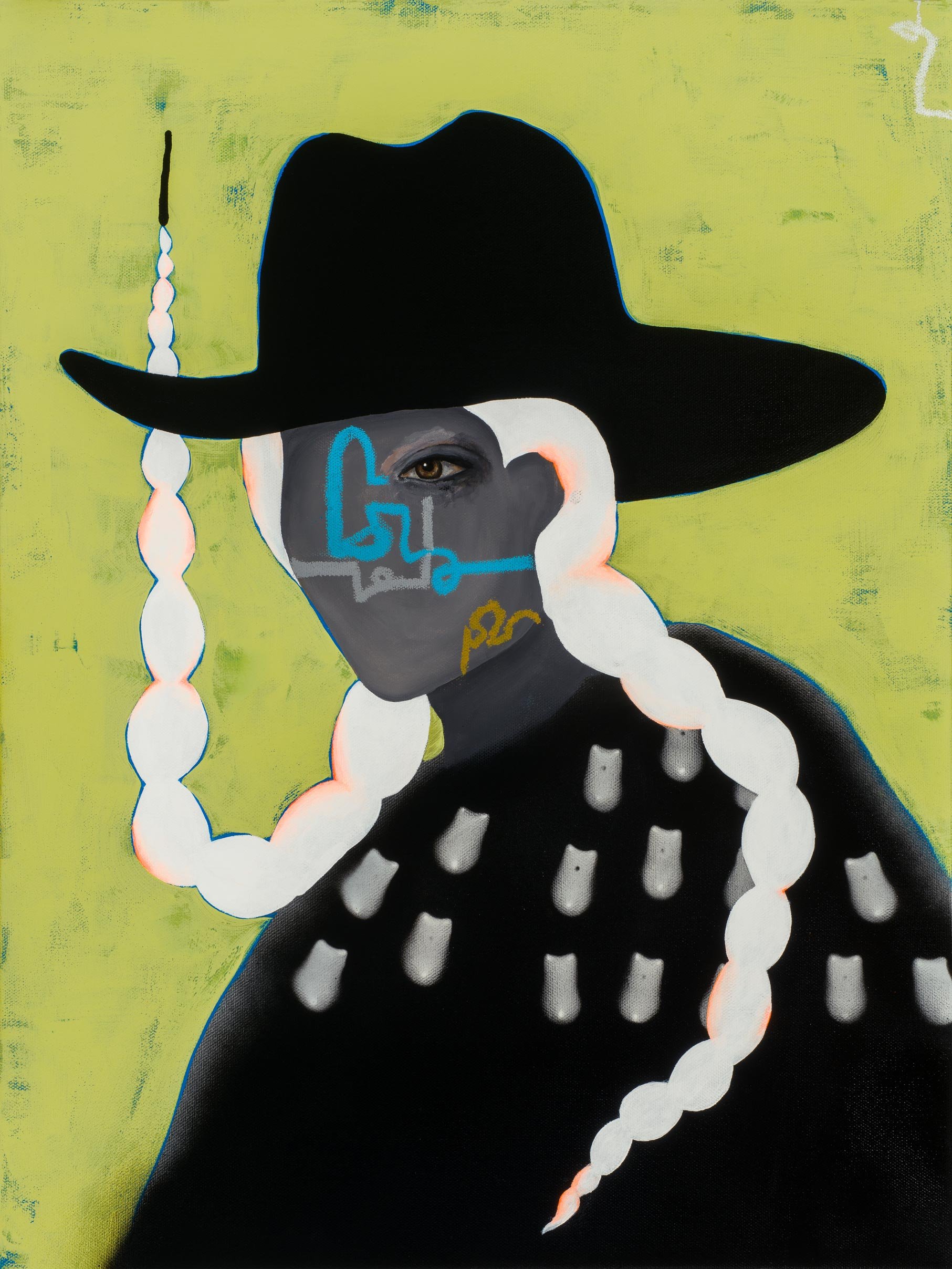
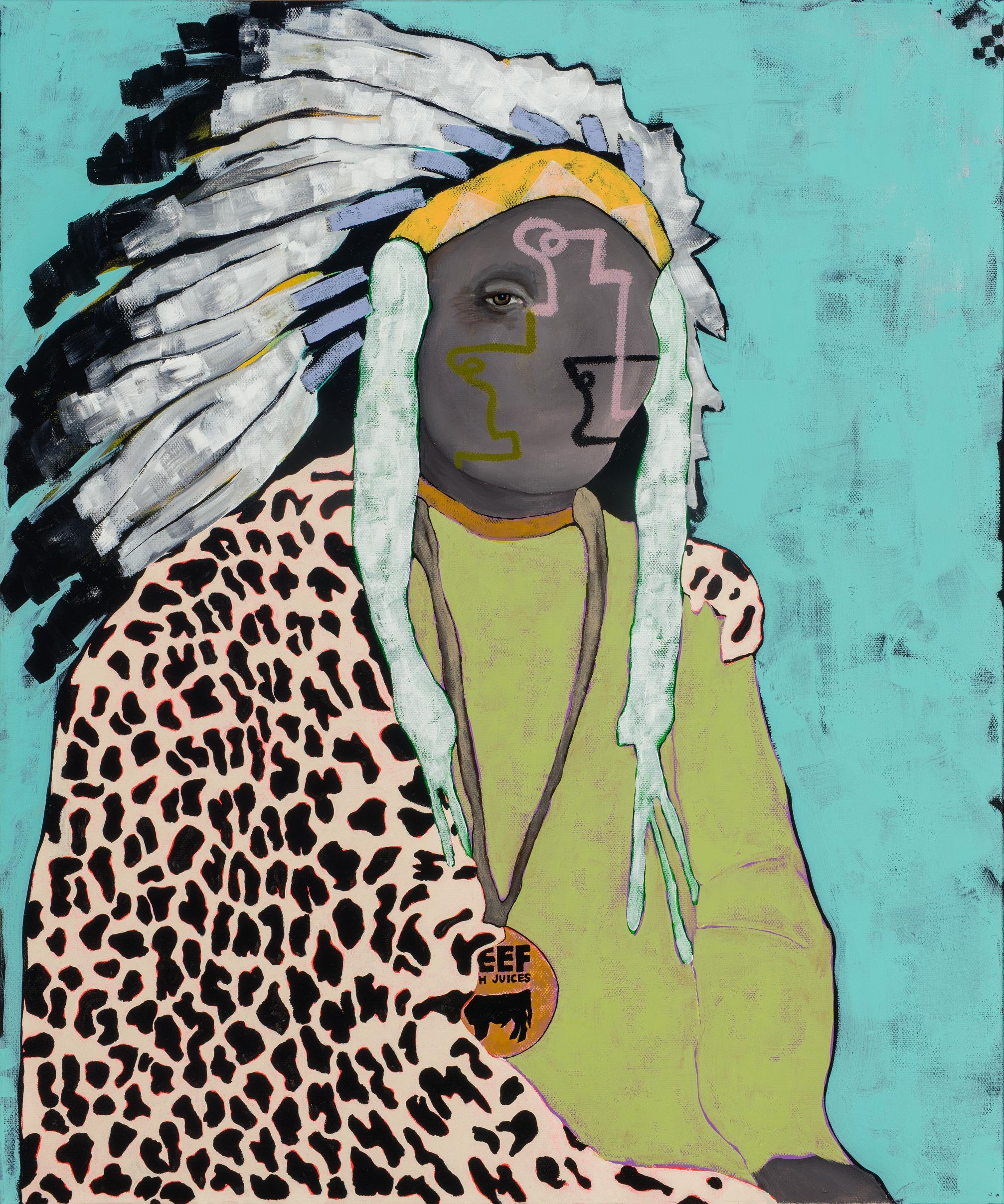
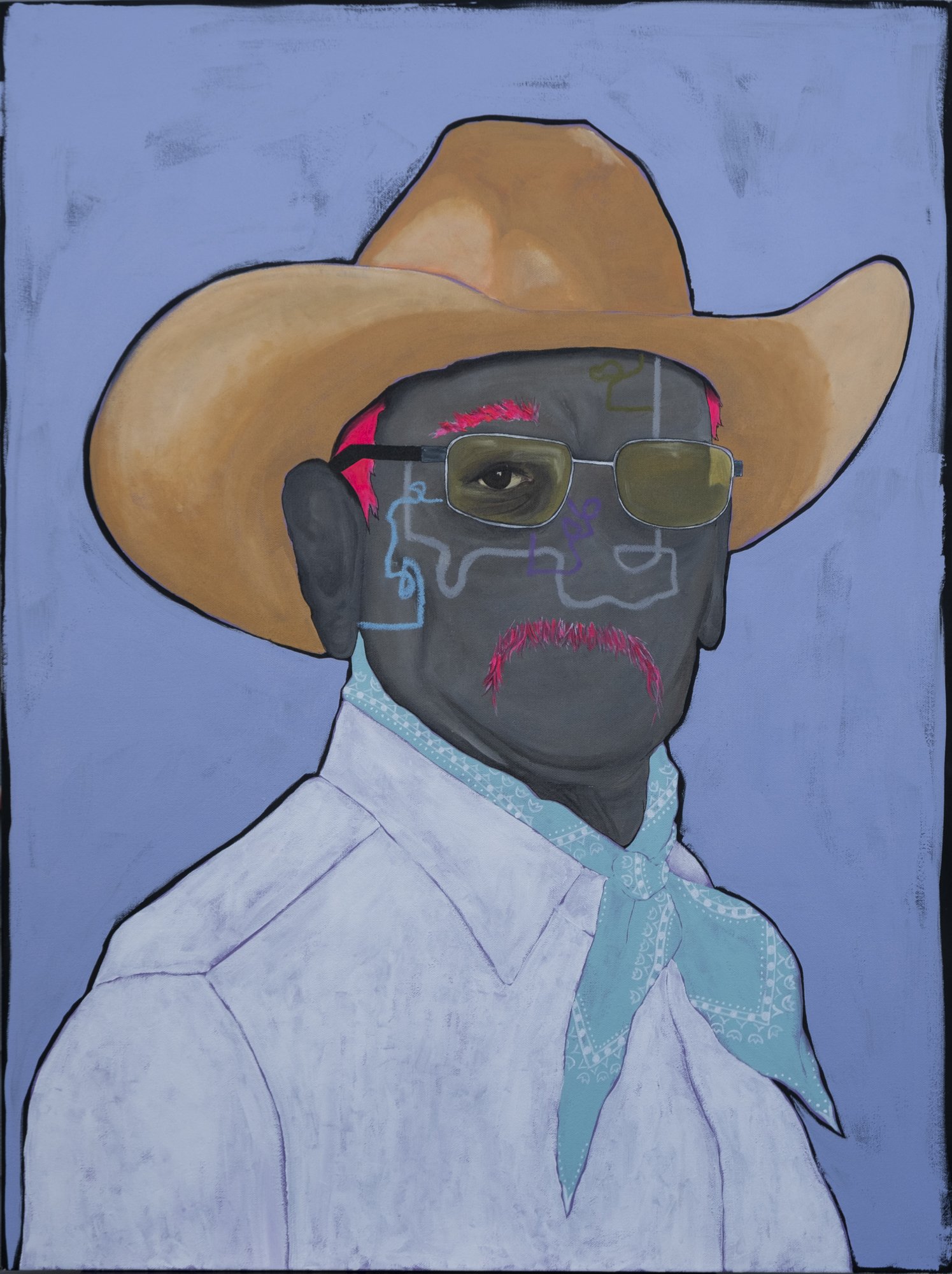
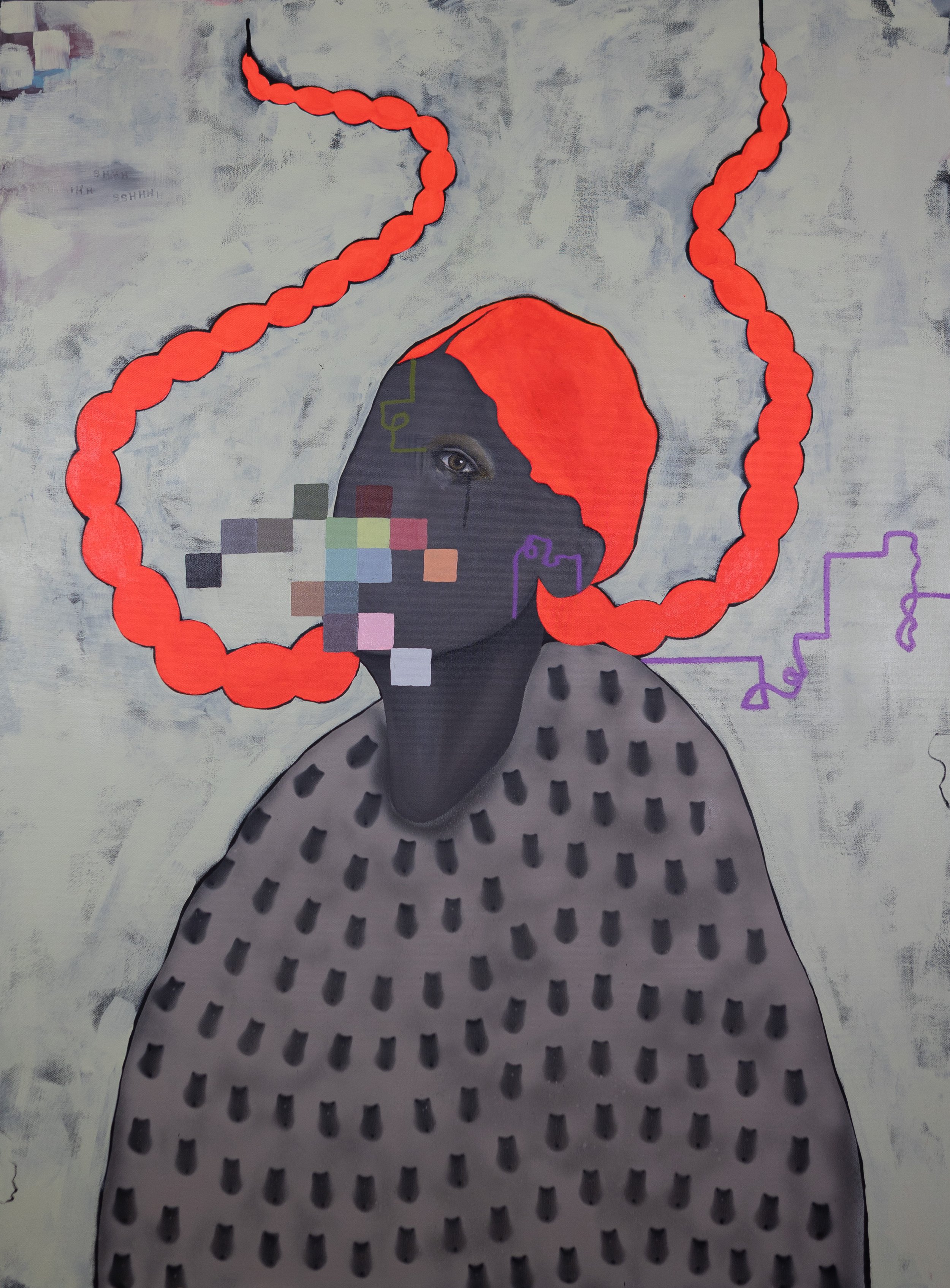

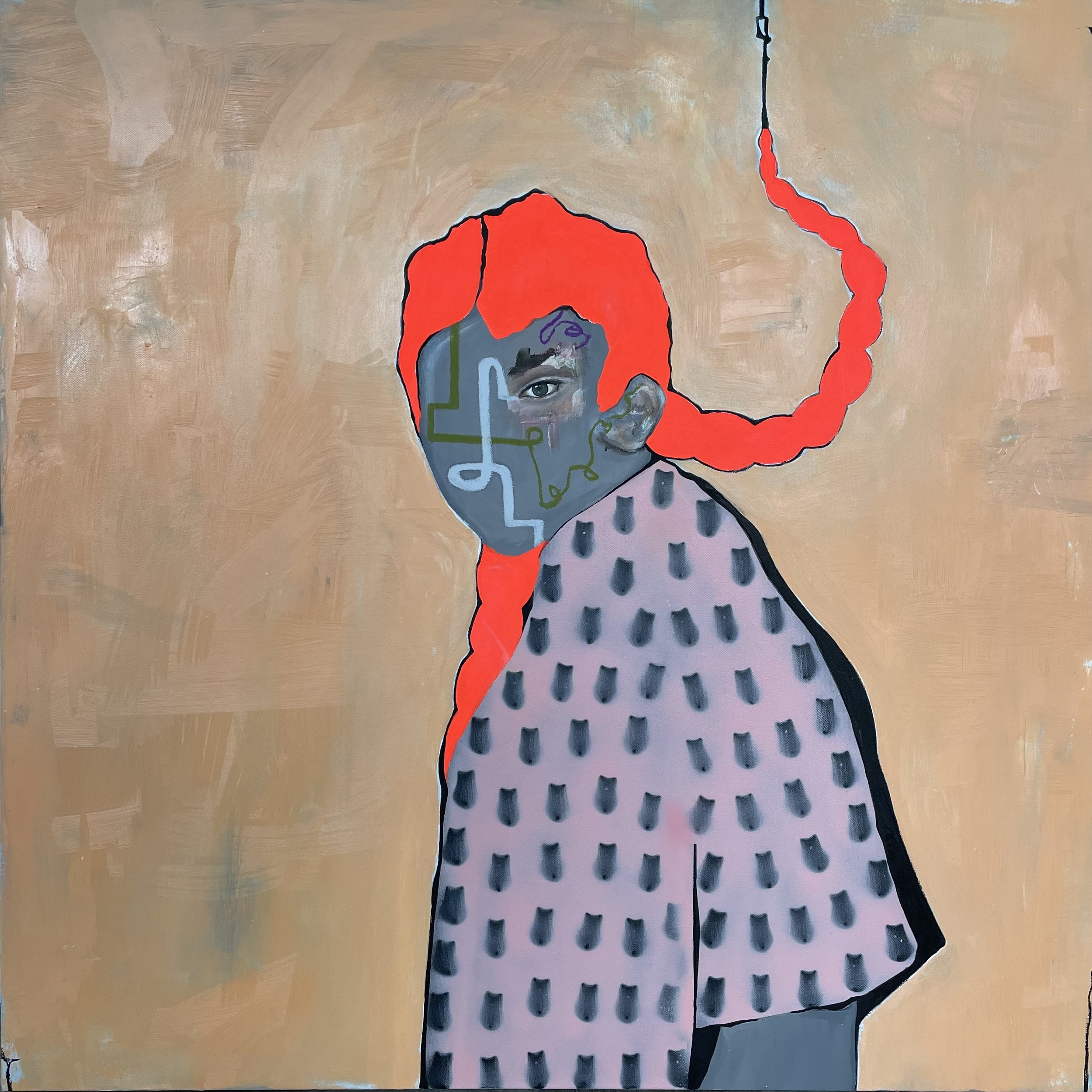
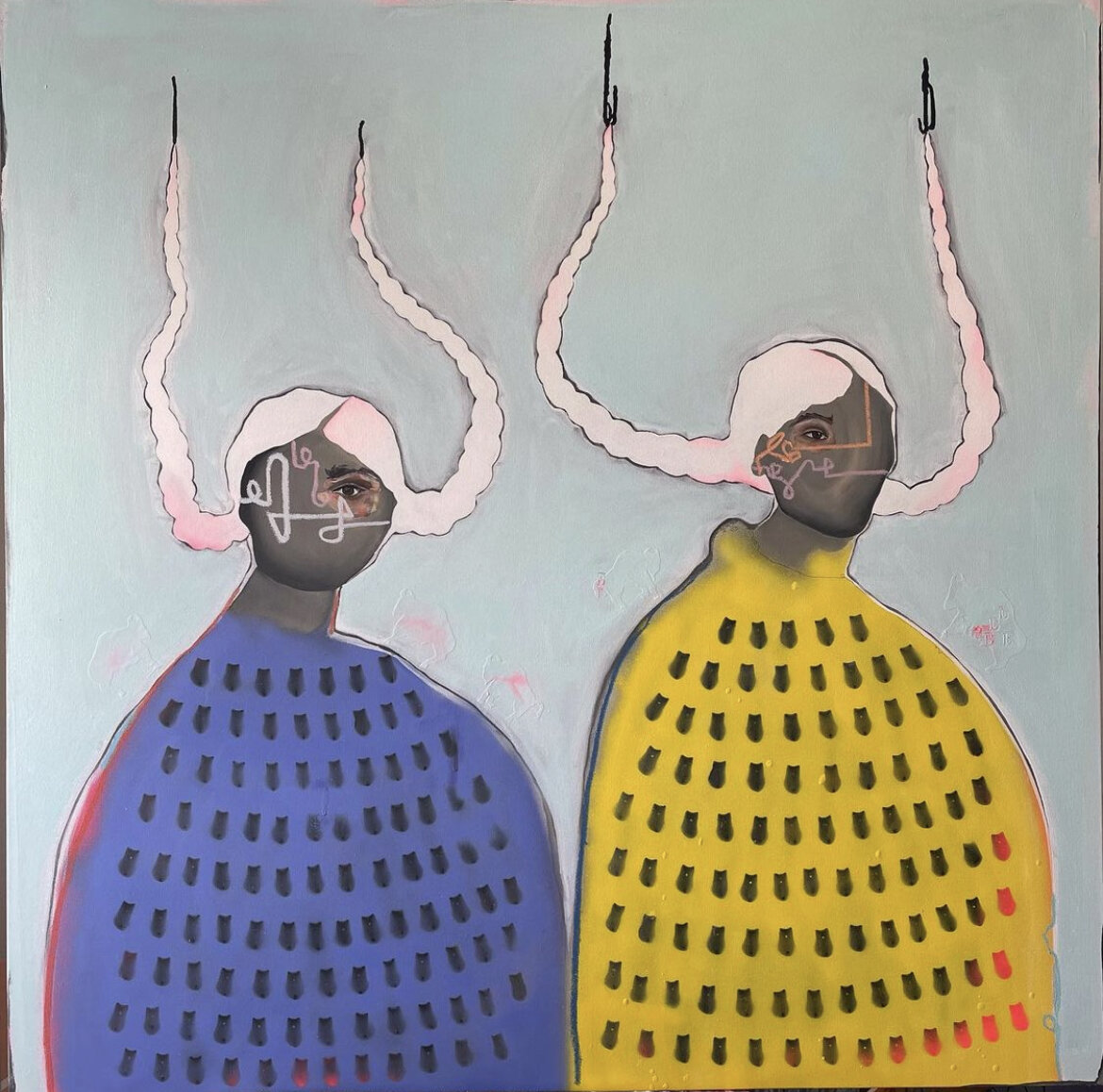
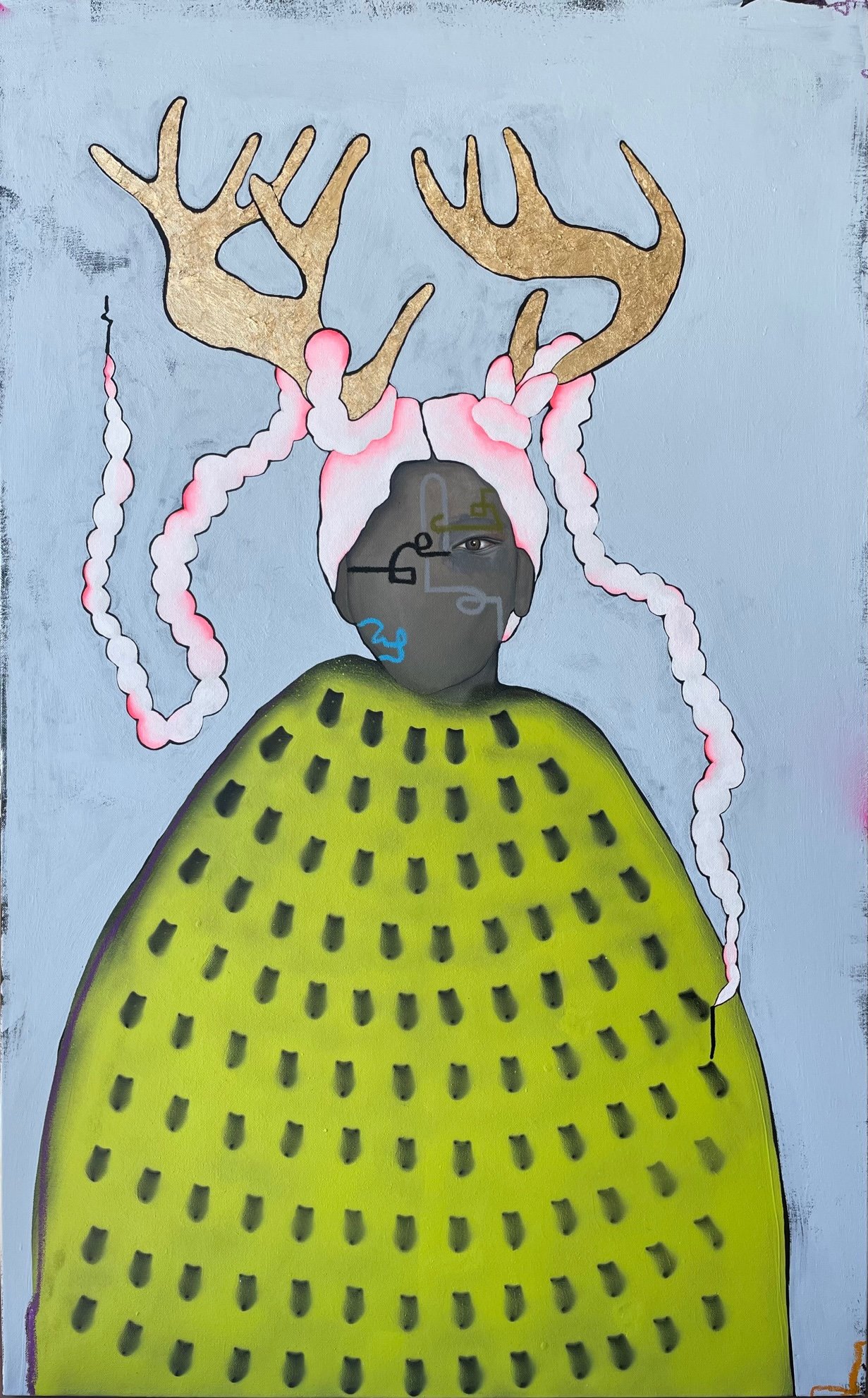
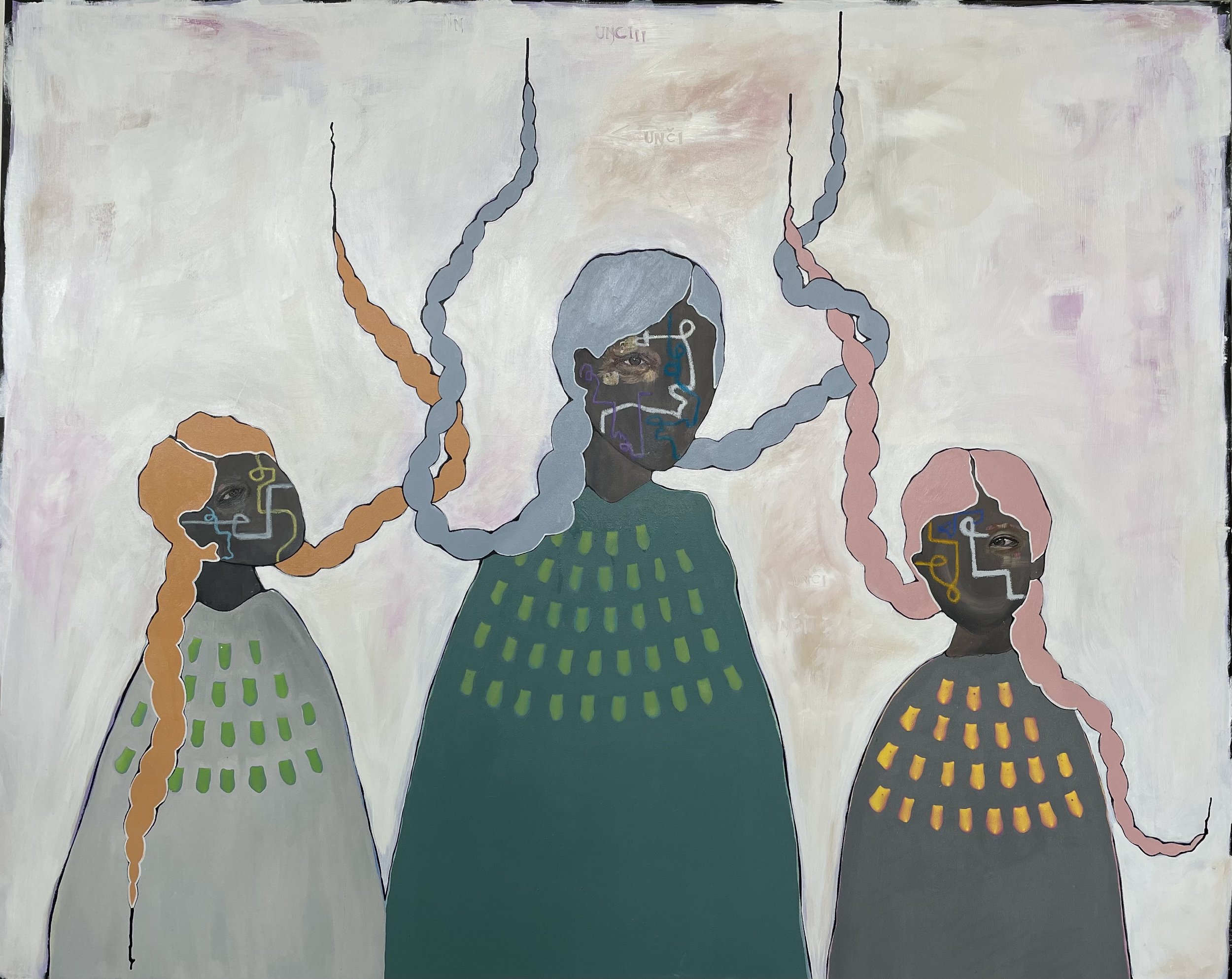
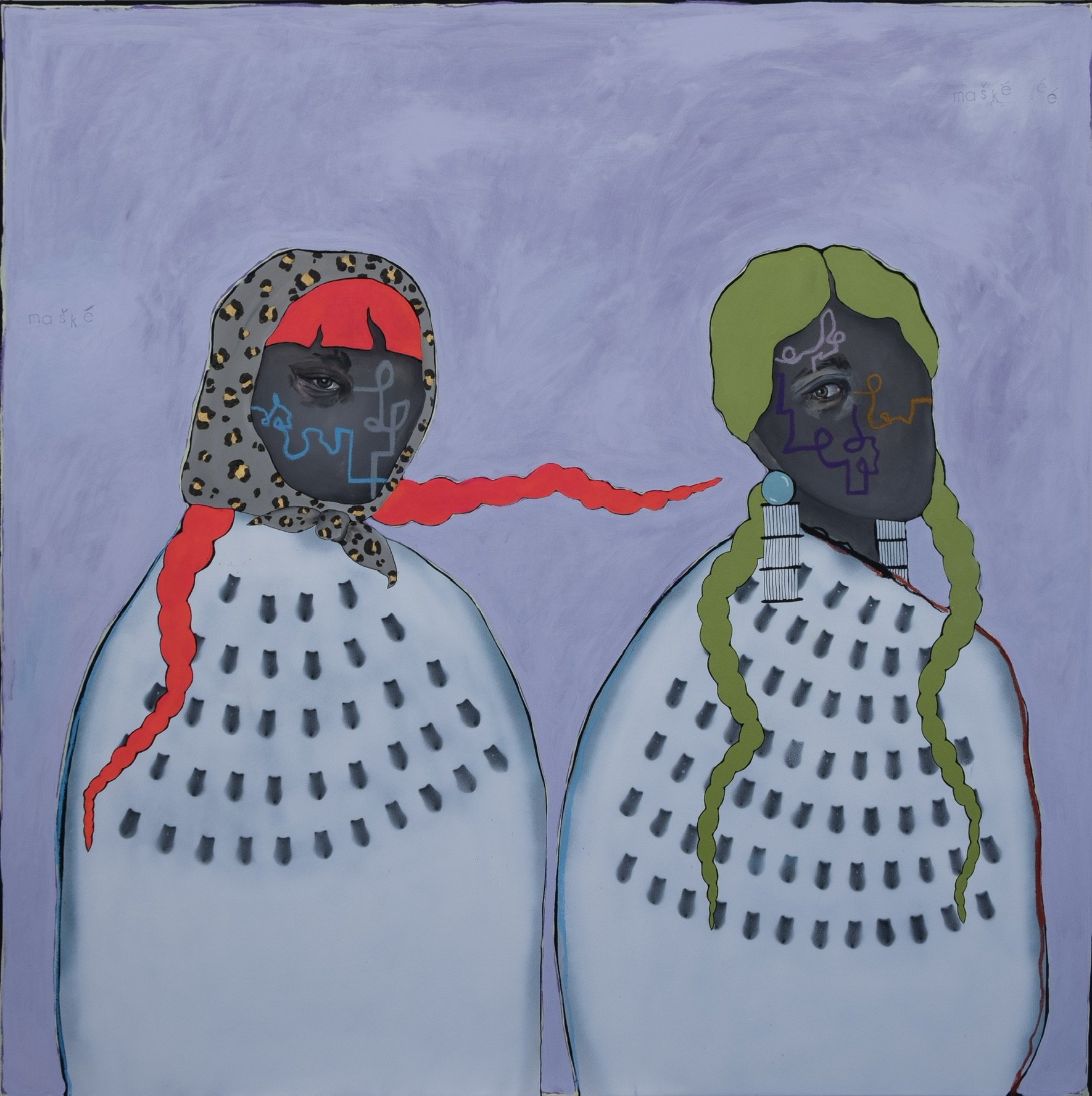


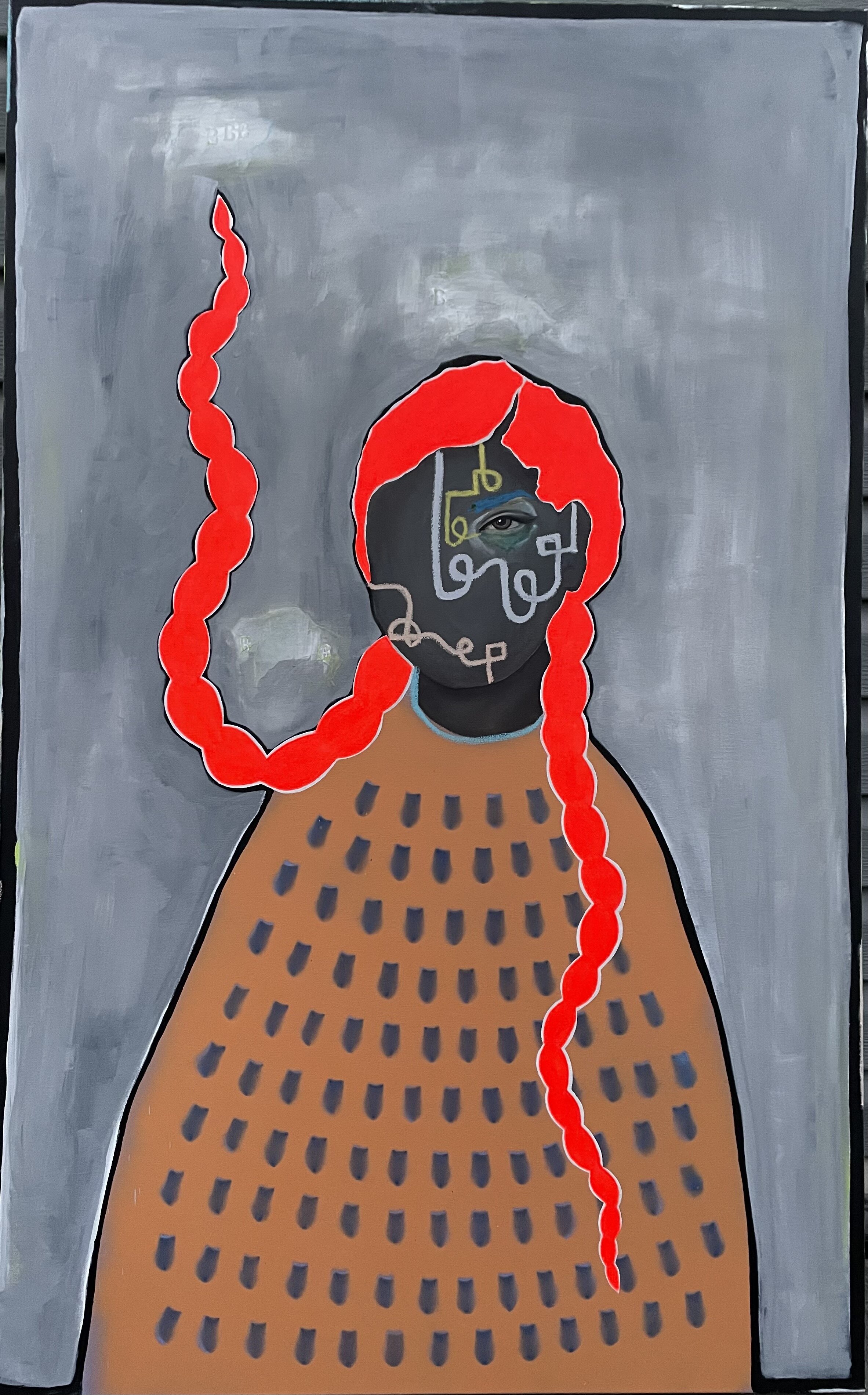
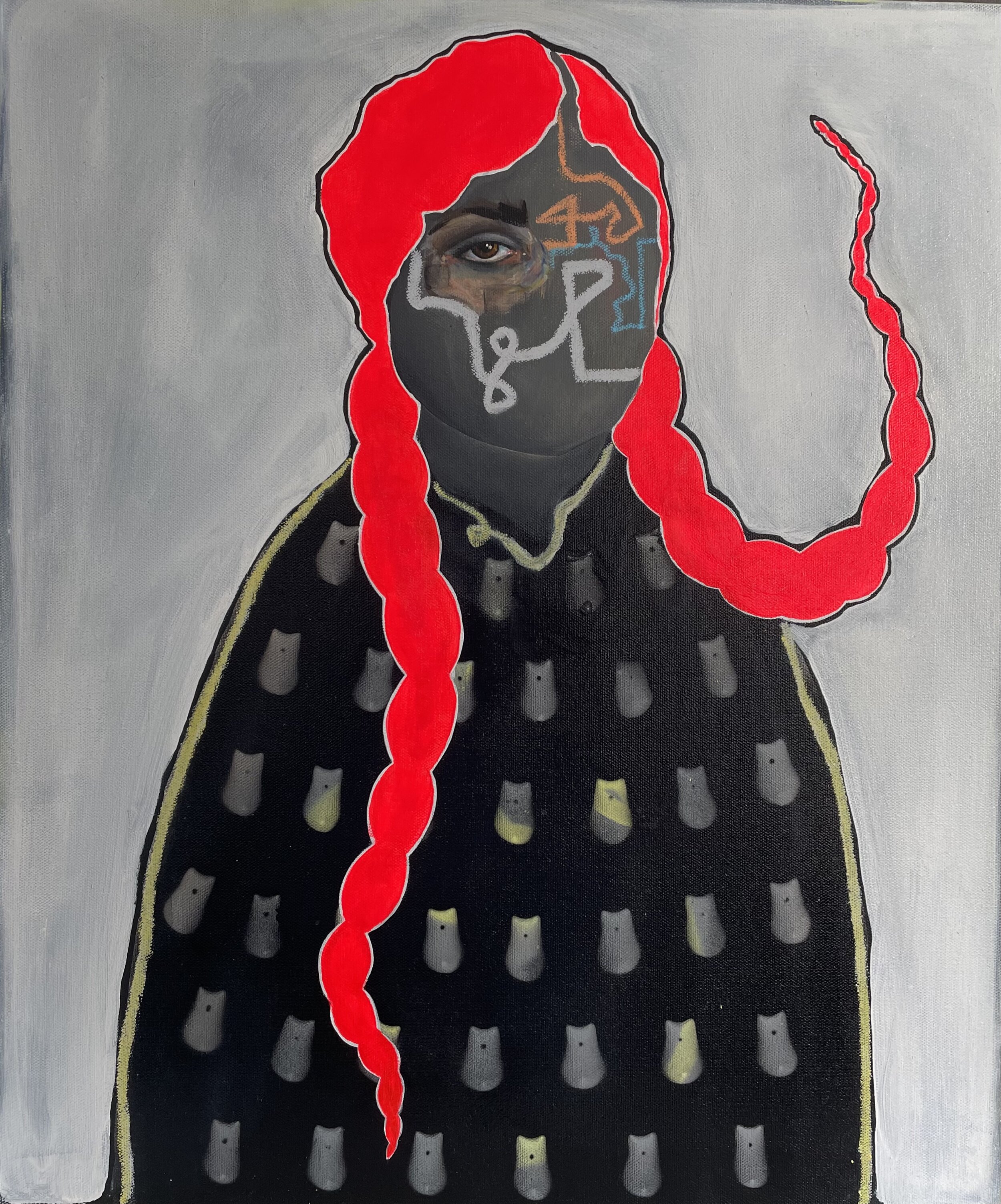




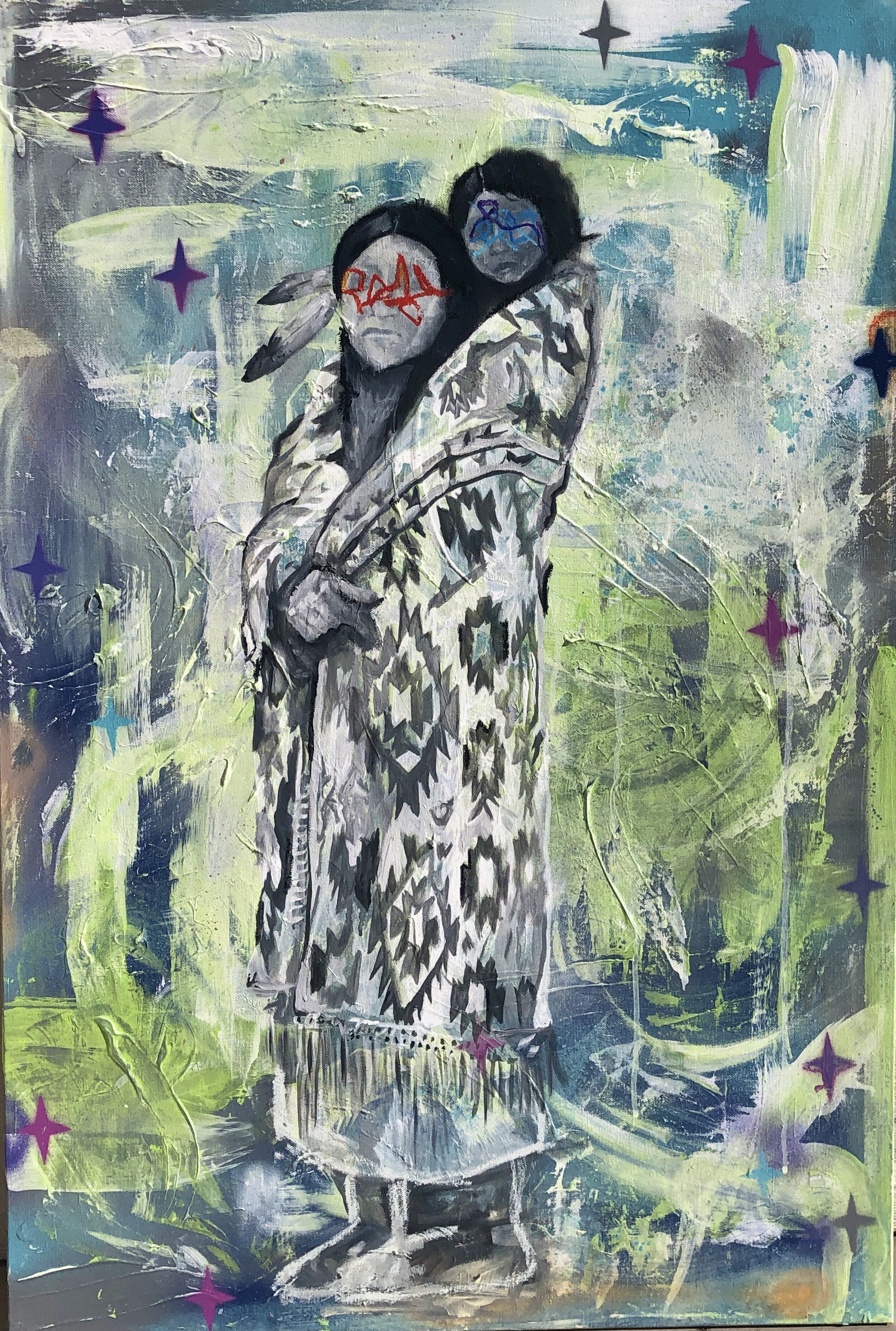
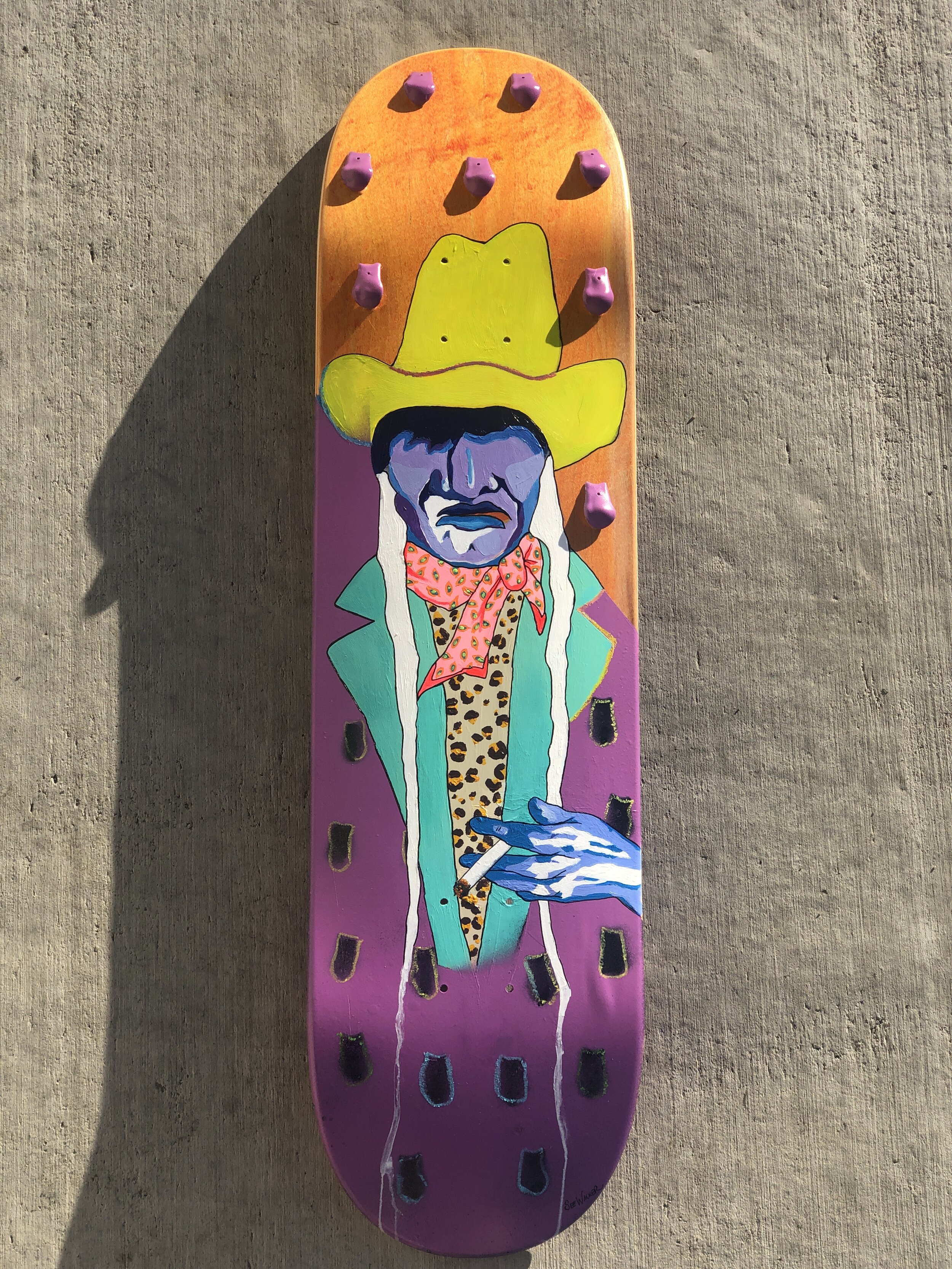





48” x 48”
Acrylic, aerosol, oil stick on canvas
•
Inspired by old stories of wíŋkte (the Lakota word that loosely translates to the colonized concept of ‘homosexuality’). Wíŋkte people have always existed since before times of colonization and since before the church made people feel shameful for loving who you love. Wíŋkte walk between the world of the masculine and feminine. To have a wíŋkte person in your family was always considered an honor and blessing. They exist between the natural and the supernatural and are considered healers and spiritual leaders. It was never a sexual existence, but a spiritual one. 🖤
•
A gorgeous fact about Lakȟótiyapi (the Lakota language), is that pronouns do not exist. We don’t have ‘she’ and ‘he’. In Lakȟótiyapi, men will speak differently than women and vice versa. We know one’s gender identity based on how they talk and what words they are using.
•
Dedicated to my wíŋkte friends & family. I honor you.

18” x 24” canvas
Acrylic, oil, aerosol, oil stick
+
I grew up hearing stories about settler cowboys coming to the Dakota Territory and claiming our Native women; often times forcibly. Impregnating them, marrying them, leaving them or even having multiples of them.
+
On display as of April 8, 2023 at the Straat Museum in Amsterdam, Netherlands.

20” x 24” canvas
Acrylic, aerosol, oil stick
+
Wades in the Water was one of the last traditional chiefs of the Blackfeet Nation. I saw his photo years ago and was so in awe of the leopard pelt he had draped over him. I told myself I’d paint a version of him someday.
+
On display as of April 8, 2023 at the Straat Museum in Amsterdam, Netherlands.

30” x 40” canvas (SOLD)
Acrylic and oil stick
+
A portrait of a beloved Lakota elder from the Standing Rock Sioux Nation and community member of Denver, CO.

36”x36” canvas; oil, acrylic, aerosol, oil stick (SOLD)
+
I often daydream what my ancestors reactions, emotions + thoughts were when they first experienced colonization. What was it like when they first saw a white person (wašíču) wearing those strange clothes, make-up & fancy hair? What did they think when they tried sugar for the first time? What about seeing or using a metal pan to cook with? How about when they first saw a covered wagon or heard the foreign language called “English”? They must have been in such awe. This piece is of a Očeti Šakowiŋ woman seeing a white person for the first time and how she just can’t help but stare and be so curious.

48” x 48” canvas (SOLD)
Oil, acrylic, ink, aerosol, oil crayon, uncashed government rez checks
+
There isn’t one Native American living today that hasn’t been touched by the Indian Boarding School era in some way. Our parents, grandparents or even ourselves have attended these “schools” and have been the root cause of the generational trauma we continue to face today. Cultural genocide and assimilation were the main goals of these schools; “Kill the Indian, but save the man”, they said. Upon entering these schools, children were forced to cut their hair, made to wear Western clothing, beaten if they spoke their languages and were brutally assaulted emotionally, sexually and physically… many didn’t make it out alive and were buried in mass, unmarked graves. When the survivors ‘graduated’ from these schools, many never spoke their languages again, they no longer felt a sense of belonging within their reservation communities, no longer practiced their cultural traditions, or even knew what it felt like to be loved or how to love when they would go onto have their own children. Depression and loss of self-identity caused many to self-medicate via alcohol abuse and generated a vicious cycle of generational trauma. My own uŋči (grandma) went through boarding school and it changed the direction of our family. Although she was a fluent Lakota speaker, she never taught her children to speak it but she did reclaim her little braids back. Our hair is an extension of who we are. Cutting off our hair is like cutting off a limb; our hair is our strength, has power, connects us to Mother Earth and carries connections to memory.

30” x 40” acrylic, aerosol, oil stick, gold leaf (SOLD)
+
‘Deer Woman’ is a figure along many Native American tribal legends where she shape-shifts into a beautiful, seductive woman. The only thing that hints at her true identity is her feet: they remain hoofed like a deer. She has been known to show up at powwows and lure men to dance with her. Men are supposed to look at the women’s feet before accepting a dance in fear it could be Deer Woman luring him in.

60” x 48” canvas; Acrylic, oil, aerosol + oil stick (SOLD)
+
Our uŋčis (grandmas) are our world. They are the sticky tree sap that holds us together. They raise us. Nurture us. Cook our most favorite nourishments. They are the keepers of knowledge and pass down the wisdom we eventually realize how grateful we are to have. Uŋčis offer the type of love no one else can offer. They can also give us that deadly stare that stops us cold in our tracks.
+
I created this painting in honor of my grandmas. My maternal grandma took me in as a small child and pretty much raised me. She taught me what it meant to be loved and feel protected. She saved me and I honor the relationship we continue to have.

48” x 48” acrylic, oil, aerosol, oil stick
+
Mašké (Lakota for a “female friend”). Our girlfriends are our secret keepers, our wing-women, our spirit lifters, auntie conference pals, our supporters & our chosen sisters. Dedicated to the incredible sisterfriends in my life - the new, the old, & the ones yet to come.

12” x 16” canvas, acrylic, aerosol, oil and oil stick (SOLD)
+
In our Lakota ways, we have specific values and teachings we must follow during our journey here on uŋči maka. The most important to me is wóuŋšiič’iye, or humbleness. We must be modest and respect ourselves and others. We cannot feel any arrogance over nature and its creatures. We cannot assume we already know the answers or that we are better or higher than another. Humility is freedom from pride and arrogance that recognizes equity and equality.

Overall size: 44” x 48”
Aerosol, acrylic, oil crayon, raw hide, tree branches, sinew, yarn
Acquired by the TIA Collection
+
Grandmas, mothers, aunties, sisters, daughters…. They have always been, and continue to be, the backbone of our Indigenous communities. We can’t be silenced.

30”x48” canvas (SOLD)
Aerosol, acrylic, oil, oil stick, uncashed government rez checks on canvas
+
Did you know most Native Americans live in urban areas today? Over 70% of us in fact. Yet many of us stay connected or grew up near/on the reservation. We walk in “two worlds”…like having an Air Jordan on one foot and a moccasin on the other.

20” x 24” canvas (SOLD)
Aersol, acrylic, oil, oil stick
+
In Lakota culture, we have three genders: female, male, and wíŋkte. Our language does not have pronouns; there is no “he” or “she”… men and women speak differently than one another and that’s how we know one’s gender identity - by the words we use. Being wíŋkte or two-spirited, is special and sacred…not demoralized. We celebrate two-spirited people because they walk between the world of the masculine and feminine and the natural and supernatural. They are held to a higher status and community members look to them. A lot of wíŋkte are healers and spiritual leaders. Their role is spiritual, not sexual. Colonization, patriarchy and Christianity is the outcome for hatred, demeaning and making one feel bad about their identity if one identifies as something other than “straight”.

24” x 24” Aerosol, acrylic, oil pastel + antique book pages on canvas (SOLD)
PRINTS COMING SOON
The term “sioux” was given to my people by French colonizers. We are not their exonym; we are the Lakota|Dakota|Nakota people.

“Išnáthi Awíčhalowaŋpi” or “Coming of Age”
24” x 24” oil, acrylic and oil pastel on canvas
+
This ceremony is an important time in a D/Lakota girl’s life...in all girls’ lives. This is a sacred time when a girl blossoms into a woman and is able to become a life-giver, our most sacred privilege as a woman.

14’ tipi - hand painted all around with scenes depicting the Battle of Greasy Grass (also known as the Battle of Little Bighorn).
AVAILABLE FOR RENTAL OR PURCHASE

(SOLD) Acrylic, aerosol, oil pastel, imitation elk teeth on wood skate deck.

“MMIWG2S” = Missing & Murdered Indigenous Women, Girls and 2 Spirits
Acrylic + aerosol on junior snowboard
